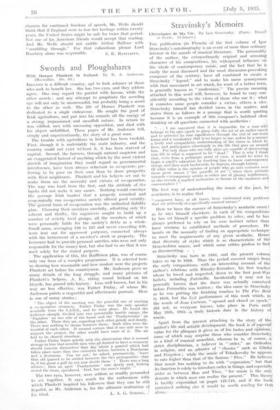Swords and Ploughshares With Horace Plunkett in Ireland. By R.
A. Anderson. (Macmillan. 108. 6d.)
IneidiNo is a difficult country, apt to look askance at those who seek to benefit her. She has two eyes, and they seldom agree. One may regard the patriot with favour, while the other scowls : and any attempt to propitiate the scowling eye will not only be unsuccessful, but probably bring a scowl to the other as well.. The life of Horace Plunkett was dedicated to a, single endeavour. He sought the .good of Irish agriculture, and put into his crusade all the energy of a strong, impassioned, and unselfish nature. In return he was vilified, met with unceasing opposition, and died with his object unfulfilled. These pages of Mr. Anderson tell, timply and unpretentiously, the story of a great man.
The trouble with agriculture in Ireland has been twofold. First, :though it is undeniably the main industry, and the
country could not exist without it, it has been starved of capital. Second, the farmers, through natural suspicion and
an exaggerated hatred of anything which by the most .violent
stretch of imagination they could regard as governmental interference, have been always reluctant to co-operate, pre- ferring to be poor on their own than to share prosperity with their neighbours. Plunkett and his helpers set out to make them sec the necessity and virtue's of co-operation.
The way was hard from the first, and the attitude of the banks did not make it any easier. Nothing would convince the average Irish banker that a properly recruited and economically run co-operative society offered good security. The general basis of co-operation was the unlimited liability
plan. Choosing their members carefully, admitting only the solvent and thrifty, the' organizers sought to build up a number of strictly local groups, all the members of which were personally liable for the society's debts as a whole. Small sums, averaging £20 to £25 and never exceeding £50,
were lent out for approved purposes, connected always with the betterment of a member's stock or property. The borrower had. to provide personalsureties, who were not only responsible for the money lent, but also had to see that it was used solely for the stated purpose.
The application of this, the Raiffeisen plan, was of course only one item of a complex programme. It is selected here as showing how reasonable and how modest were the projects Plunkett set before his countrymen. Mr: Anderson gives us many details of the long struggle, and many pictures of Plunkett's helpers. A. E., riding round Ireland on his .bicycle, has passed into history. Less well known, but in his way no less effective, was Father Finlay, of whom Mr. Anderson paints a respectful and affectionate portrait. Here is one of •many stories :
" The object of the meeting was the peaceful one of starting a co-operative creamery. Father Finlay was the only speaker available from the I.A.O.S., and he wont alone. Ho found the audience sharply divided into two potentially hostile camps, the Papishes ' on one side of 'the house 'and the Prasbyterians ' on the other. There they sat, regarding each other grimly and dourly. There was nothing to choose between them. - Both sides were dis- trustful of each other. It seemed- certain that if one side were to support the project, the other would have none . of it. The air had to be cleared somehow.- .
Father Finlay began quietly with the observation that it seemed strange to him that sensible men who.stil desired to have a creamery should concern themselves 'that day abiiiit 'a quarrel which had taken place more than two centuries before, between a Dutchman and a Scotsman. 'Can we not,' he. asked, persuasively, ' leave that old quarrel to be settled between the two protagonists—that is, if too great a gulf do not now divide them' ? There was a long silence ; then an aged Prasbytarian ' rose slowly and, looking round the room, ejaculated, Dod, but the mon's raight.' "
The two eyes, however, were seldom so readily persuaded to sce together. It says much for the enthusiasm with which Plunkett inspired his follower§ that they can be still hopeful, as Mr. 'Anderson is; for the ultimate • realization of his ideal. .. L.- A.. G. STRONI.1...-;














































 Previous page
Previous page